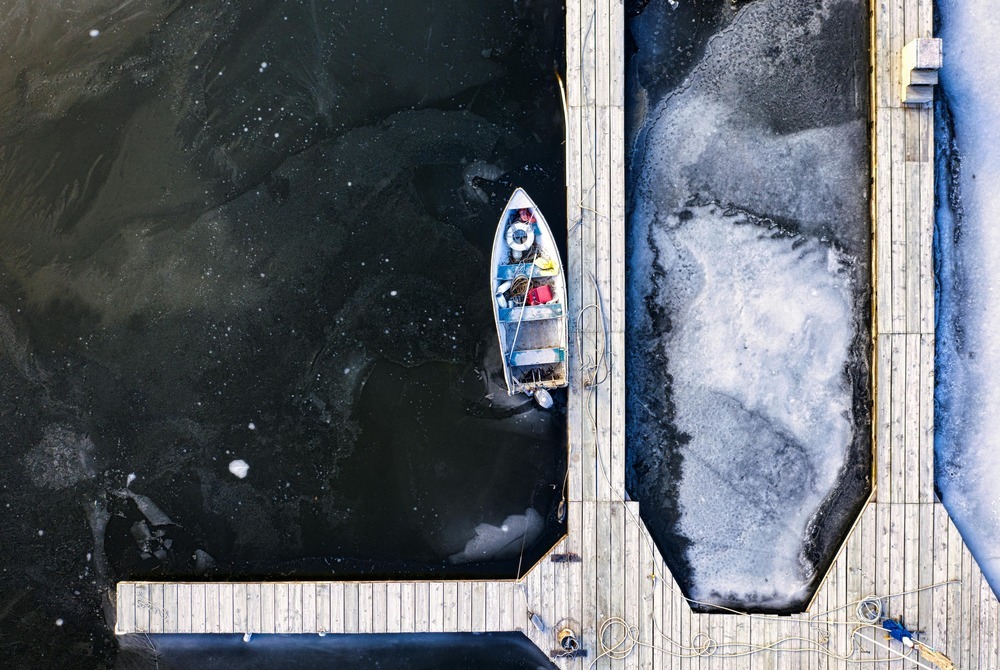
As the vibrant greens of summer in Haldimand County fade into the rustic golds and reds of autumn, and the last few sunny days are spent enjoying the waters near the Port Dover Lighthouse, every boat owner in Nanticoke knows what’s coming next. The hot, humid summers of our distinct humid continental climate give way to cold, harsh winters, and with that transition comes the crucial task of storing your beloved boat. Here at Haldimand Self Storage, located at 15 Hawk Street, we’ve seen our fair share of boating enthusiasts, and we’ve also seen the costly consequences of improper winter storage which is why we recommend winterizing your boat. To help you protect your investment, we’ve compiled a list of the five most common mistakes people make when storing their boats for the winter.
It's tempting to pull your boat out of the water after that final trip and head straight for storage. However, storing a dirty boat is a recipe for disaster. Any salt, algae, or grime left on the hull can cause corrosion and staining over the winter. Inside, any lingering moisture in the carpets or upholstery can lead to a nasty surprise of mold and mildew come spring, especially with the fluctuating temperatures and humidity we experience in Nanticoke. Before storage, give your boat a comprehensive cleaning, inside and out. It’s a bit of work now, but it will save you a lot of time and money on repairs and deep cleaning later.
The heart of your boat is its engine, and it needs special attention before its long winter nap. One of the most damaging mistakes is not winterizing the engine properly. Water left in the engine block can freeze and expand, leading to catastrophic cracks. It's essential to flush the engine with fresh water and run antifreeze through the cooling system. Similarly, the fuel system can’t be ignored. Untreated fuel can degrade over the winter, gumming up the fuel lines and carburetor. The best practice is to fill the fuel tank to about 90% capacity to prevent condensation, add a fuel stabilizer, and run the engine for a few minutes to ensure the treated fuel circulates throughout the system.
Your boat's battery will slowly lose its charge over the winter, and if it's left connected, the drain will be even faster. A fully discharged battery is susceptible to freezing, which can damage the cells and significantly shorten its lifespan. The best course of action is to remove the battery from the boat, clean the terminals, and store it in a cool, dry place, preferably on a trickle charger to maintain its charge throughout the off-season. This simple step ensures that when the warm weather returns, your boat will be ready to roar back to life.
While it may seem like any tarp will do, using a non-breathable plastic tarp can do more harm than good. These tarps trap moisture, creating a perfect environment for mold and mildew to thrive. Furthermore, they can chafe against the boat's gelcoat in the winter winds, causing scratches and damage. A proper, high-quality boat cover is made of a breathable material that allows moisture to escape while still protecting the boat from the elements. For ultimate protection, especially from the heavy snow we can get in Southern Ontario, consider a professionally installed shrink-wrap cover.
Where you store your boat is just as important as how you prepare it. Leaving your boat exposed to the elements in your driveway is a risky proposition. The harsh winter sun can fade the gelcoat, and the weight of accumulated snow and ice can damage the boat's structure. For residents of Haldimand County, a dedicated storage facility is the best choice for peace of mind. At Haldimand Self Storage, we offer a variety of boat storage options, from outdoor parking spaces to large drive-up units. For those who want the absolute best protection for their investment, our climate-controlled units maintain a stable temperature and humidity level, safeguarding your boat from the most extreme winter conditions.
Preparing your boat for winter storage is a critical part of responsible boat ownership. By avoiding these common mistakes, you can ensure that when the ice on Lake Erie thaws and the days get longer, your boat will be in pristine condition and ready for another season of adventure. Before you find yourself making a trip to Red Apple Rides to pass the time, make sure your boat is tucked away safe and sound. For all your boat, RV, and vehicle storage needs, feel free to visit us at Haldimand Self Storage in Nanticoke. We’re here to help you protect what matters most.